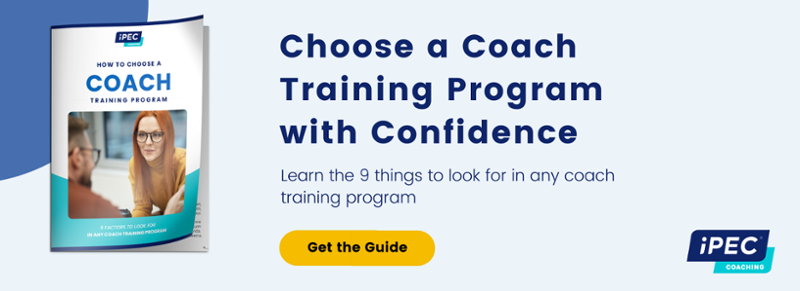You’re Not Too Old (or Too Young) to Establish a Coaching Career
by Kieran Diorio, CPC, ACC, PCC, ELI-MP
Jun 19, 2019 | 3 minutes read%20to%20Become%20a%20Coach.jpg)
Does your age really matter when it comes to coaching others?
I talk to many potential students who are afraid they are “too young” to be taken seriously as coaches. On the other end of the spectrum, I hear from older people who are nervous about being seen as irrelevant and out of touch with current society.
Conquering age-related fear is often one of the many self-imposed hurdles students face when they are weighing the decision to become a life coach. But truthfully, age is one of the least important factors when deciding whether to enroll in coach training—for a number of reasons.
Age is only a measurement
The number of candles on your last birthday cake has little bearing on your life choices, the experiences you've had, or the passion and drive you have for your calling. Making your age the qualifier for whether or not you should be a coach ignores your ability to provide value to those who confide in you.
Perhaps you always found yourself providing a sounding board and sorely-needed empathy to college friends facing tough decisions. Maybe you found yourself mentoring younger people in your organization, helping them gain their footing and grow confident in their new positions.
Or possibly, you just always found yourself coming up with exactly the right tidbit to share with a troubled friend at the right time.
People who end up in coaching school have often been “coaching” others all along, without recognizing it.
But once they do, and they realize how energized and fulfilled they feel from these experiences… they can build a fulfilling professional career using true coaching skills.
In the end, completing coach training is really about recognizing a talent and desire within you, and giving you the concrete skills to make your guidance more effective—which is a bonus at any age, but certainly doesn’t depend on your age.
Coaches come in all ages
In 2016, the International Coach Federation commissioned a global study to gain a better understanding of who coaches are, what their training is, and what they spend their time doing. Over 12,000 individuals replied, and the results were eye-opening.
Although the majority of new coaches begin their careers in their mid-40s, that demographic certainly does not account for all new students. The study shows there is a wide range of ages within the coaching profession and those using coaching skills within their organizations—from young 20-somethings to end-of-careerists—who are looking to help others by transitioning to a new calling.
This means that regardless of your age, there is a very good chance you’ll find a place to apply your skills and knowledge. It’s just a matter of finding the right space for you, which leads us right into my next point.
Your age is perfect for your ideal coaching client
Perhaps the most telling evidence that “age is no barrier” to learning new skills and starting a new career is the proof I’ve seen from iPEC’s own students. Whether your age affects you or not depends firstly on the importance you give it (which we discussed above) and secondly on the clients you intend to serve.
“Niche-ing down” into your expertise and ideal client is absolutely the best thing you can do to make sure that your skills and passions (and age) are aligned. By drilling down into who you are, the experiences you’ve had, and what drives you, you’ll be able to choose a field of expertise that complements the knowledge you’ve already acquired.
It’s highly unlikely that you don’t have an expertise, even if you’re relatively young. And if you’re older… well then you have more to choose from!
One of iPEC’s graduates has taken advantage of her age and expertise and turned it into a selling point: she coaches companies on how they can relate to and work better with their millennial employees—talk about a specific niche!
She wouldn’t be able to do the work she does if she didn’t have an intimate understanding of the millennial mindset. In this way, her age is an important asset to her business.
But shouldn't you have your life together first?
One of the other objections I hear that’s often lumped in with age is the perception that one cannot be a coach if they’re still working through the messes in their own lives and don’t have it all “together.”
The reality is that both young and old express this feeling and NOBODY has their life perfectly buttoned up in every way. (It’d be a pretty boring world if we did, wouldn’t it?)
The iPEC Coach Training Program is designed to be experienced. It’s not enough to learn the theory of coaching from a book or watching a video, which is why we begin with an experiential training where you’re up and out of your seat… coaching others, being coached, and participating in a variety of skill-building exercises.
It doesn’t matter if your life is messy because when YOU experience the power of coaching for yourself, you’ll be better able to help those you coach experience it too. Your willingness to show up and share your own coaching experiences will lead to a deeper, richer relationship between you and your client (even if your life isn’t perfect).
Ultimately, chronological age is not a good indicator of your passion and ability to help others.
Are you ready to follow your passions and start on your journey to benefit others? Let’s have a chat to talk about how iPEC coaching can help you achieve your dream.


